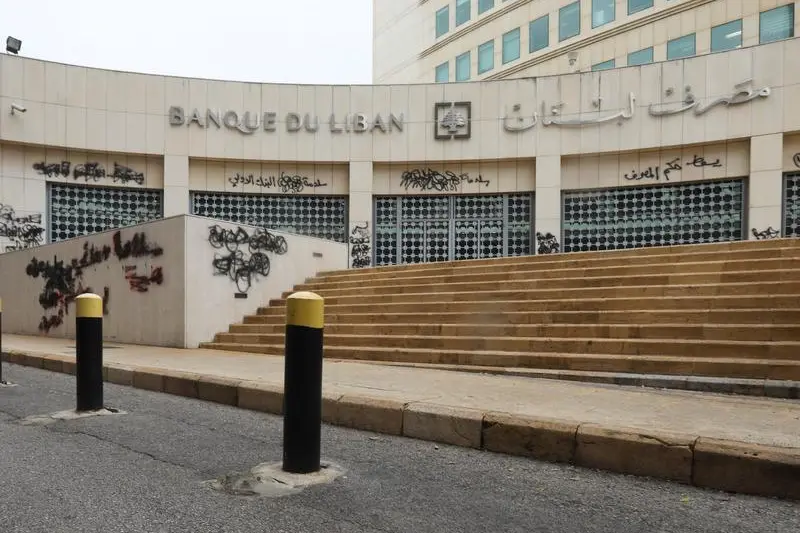PHOTO
BEIRUT: Lebanons Central Bank can subsidize fuel oil, wheat, pharmaceutical products and EDL for three months only, an informed source said Thursday.
Central Bank governor Riad Salameh informed the government in the last meeting that BDL can only use $2.3 billion of the $19.8 billion foreign currency reserve to subsidize the basic items. This means that BDL can continue injecting only $700 million a month for the next three months, the source told The Daily Star on condition of anonymity.
BDLs foreign currency reserves dwindled sharply over the past year due to sharp devaluation of the national currency against the US dollar and its constant intervention in the market to keep the Lebanese pound stable.
The governor told the government before its resignation that the remaining foreign currency reserves belong to the depositors and for this reason he is not going to touch them.
The source explained that once BDL ends subsidies of these basic items, the prices of these items will be in line with the international market and this means that the consumers will notice a remarkable increase in the prices of fuel oil, bread and medications in the market.
Salameh has no other choice but to stop subsidizing these items. The governor argues that the remaining $17.5 billion are the required reserves of BDL, the source said.
The Central Bank has been subsidizing the basic items for nearly 20 years in a bid to ease the burden on Lebanese consumers.
The International Monetary Fund and other international financial institutions have been urging all the successive governments in Lebanon to lift all the subsidies and to channel part of these funds for poor families.
The source revealed that the government of Prime Minister Hassan Diab that resigned in light of the Beirut Port blast was studying a plan to lift gradually the subsidies on EDL, fuel oil, wheat and medications.
The government realized this subsidy program has drained the resources of the Treasury and BDL. The plan was to cut the subsidies on electricity consumption in a way that only the affluent families can feel the rise in electricity bills, he added.
The source stressed that Lebanon has no alternative but to end subsidies and create a safety net to support poor families.
A big chunk of these subsidies are not going to the right people. Some people are taking advantage of these subsidies to make a fortune. The World Bank and ESCWA said that over 50 percent of the population lives below the poverty line. The new government must create a sound safety net to support these families on monthly basis, he added.
The source said that the new government should issue coupons for poor families each month so they can use them to fill their cars with gasoline and buy other basic items, noting that LL500,000 for each family is a reasonable rate.
Many economists have called for the removal of these subsidies gradually and to educate the public to cope with this situation.
They argue why the rich should enjoy these subsidies at the cost of poor people.
The new government has to increase the bill on the rich people who consume lot of electricity. The caretaker government cant take the step and its up to the new Cabinet to undertake this task, the source said.
Louis Hobeika, professor of finance and economics at NDU, also supported total lifting of the subsidies and the creation of a safety net for the poor families.
Granting monthly allowances to poor families is far less costly than bearing the high cost of subsidies. I prefer the poor families to receive the cash directly from the government to purchase their basic needs, he added.
For his part, Marwan Barakat, chief economist and head of research of Bank Audi, told The Daily Star that the annual foreign currency financing needs lying on the burden of the Central Bank are quite significant relative to the size of the foreign currency reserves at hand.
Those foreign currency needs amount to no less than $10 billion per annum covering the financing of basic consumption products (wheat, pharmaceuticals, gasoline), the financing of the newly subsidized food basket, the financing of fuel oil for EDL and the financing of BDL intervention on the parallel FX market, Barakat said.
He added that BDLs foreign assets are today at $30 billion, including a portfolio of $5 billion of Lebanese sovereign Eurobonds and $9 billion of FX loans to Lebanese banks, which leaves a mere $16 billion of liquid FX reserves at the Central Bank.
As such, a gradual erosion of reserves is henceforth anticipated, with adverse potential effects on the monetary situation, inflation and socio-economic conditions. The only way to break such a vicious circle is to secure foreign assistance, which calls for a full-fledge program with the IMF that will ensure direct IMF loan in addition to the indirect potential impact on other donors, shall such a program be in place, Barakat said.
Copyright 2020, The Daily Star. All rights reserved. Provided by SyndiGate Media Inc. (Syndigate.info).





















